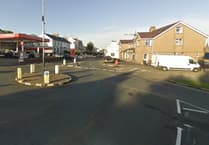Feathers have been flying this week in the world of pigeon racing, after it was revealed that a large number of birds (including eight belonging to the Queen) died in the sport’s biggest competition in South Africa.
Animal welfare groups claim that the South African Million Dollar Pigeon Race is gruelling and cruel for the birds, with some flying almost 400 miles in very hot weather. The number lost in this year’s race, which finished in February, was particularly high with 1,000 birds dying in quarantine in South Africa from a virus.
Only 800 of the remaining 4,000 birds, entered from 36 countries, made it home.
Some birds die of dehydration and exhaustion, and some are killed by predators such as hawks and cats.
The Isle of Man is often used as a stopping off point by racing pigeons trying to return to their lofts in Ireland or Great Britain, and we sometimes receive calls from people asking how they can help a pigeon that has landed in their back garden.
Our advice is to give the bird some fresh water in a shallow bowl, along with some bird seed, crushed cornflakes or uncooked rice (but not bread), and before too long it will resume its journey home.
If the bird is injured then gently throw a towel over it, place it in a ventilated box, and take it to a vet who will give it emergency treatment free of charge.
Some racing pigeons are very valuable, with prices for prize birds being inflated by a growing interest in the sport in China. Last year a Chinese bidder paid £1.07 million for a Belgian bird called Armando, dubbed the ’Lewis Hamilton of pigeons’ after he won his last three races, before being put out to stud.
Closer to home, Manx Wild Bird Aid has advised us that they are caring for many chicks that have been discovered in the following scenarios:
â?¢Builders undertaking roof works and discovering nests, eggs and chicks
â?¢Farmers and gardeners removing vegetation, including hedges and bramble patches, and discovering nests, eggs and chicks.
All birds, their nests, eggs and young are protected by law (the Wildlife Act 1990) and it is an offence to:
â?¢intentionally or recklessly kill, injure or take any wild bird
â?¢intentionally or recklessly take, damage or destroy the nest of any wild bird whilst it is in use or being built
â?¢intentionally or recklessly take or destroy the egg of any wild bird
â?¢intentionally or recklessly disturb any wild bird listed on Schedule 1 while it is nest building, or at a nest containing eggs or young, or disturb the dependent young of such a bird.
The maximum penalty that can be imposed for a wildlife crime like this - in respect of a single bird, nest or egg - is a fine up to £10,000.
The bird nesting season is usually between late February and late August, or late September in the case of swifts, swallows or house martins.
During the bird nesting season all buildings and vegetation should be checked first for nesting birds before undertaking any works.
Please also spare a thought for hedgehogs if you’re planning to remove vegetation, particularly if you’re strimming or mowing through long grass and hedges.
Many hedgehogs are killed by cutting machines every year, and so make plenty of noise and poke about with a stick so that a sleepy hog has the chance to run away.




